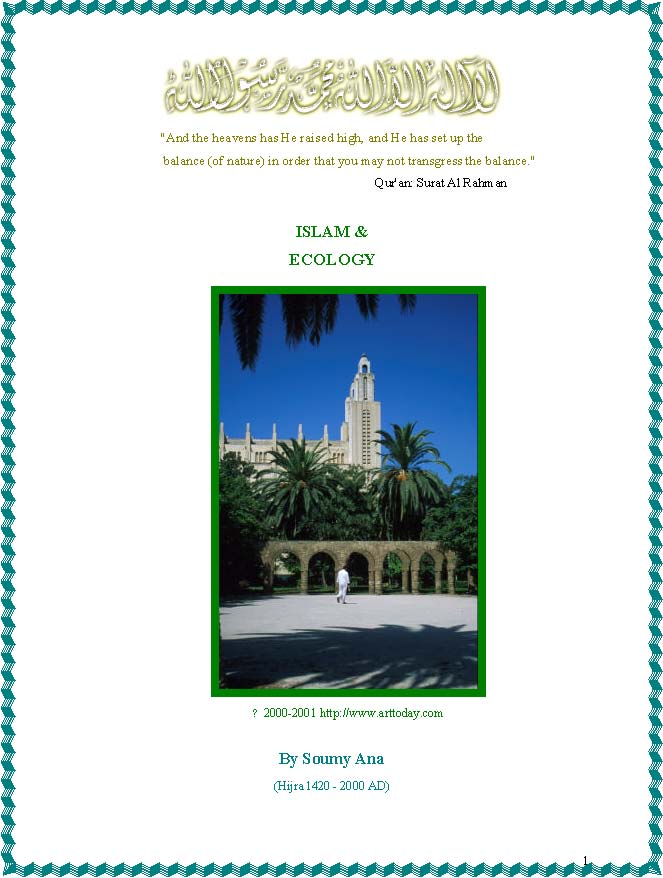By Soumy Ana
(Hijra 1420 - 2000 AD)
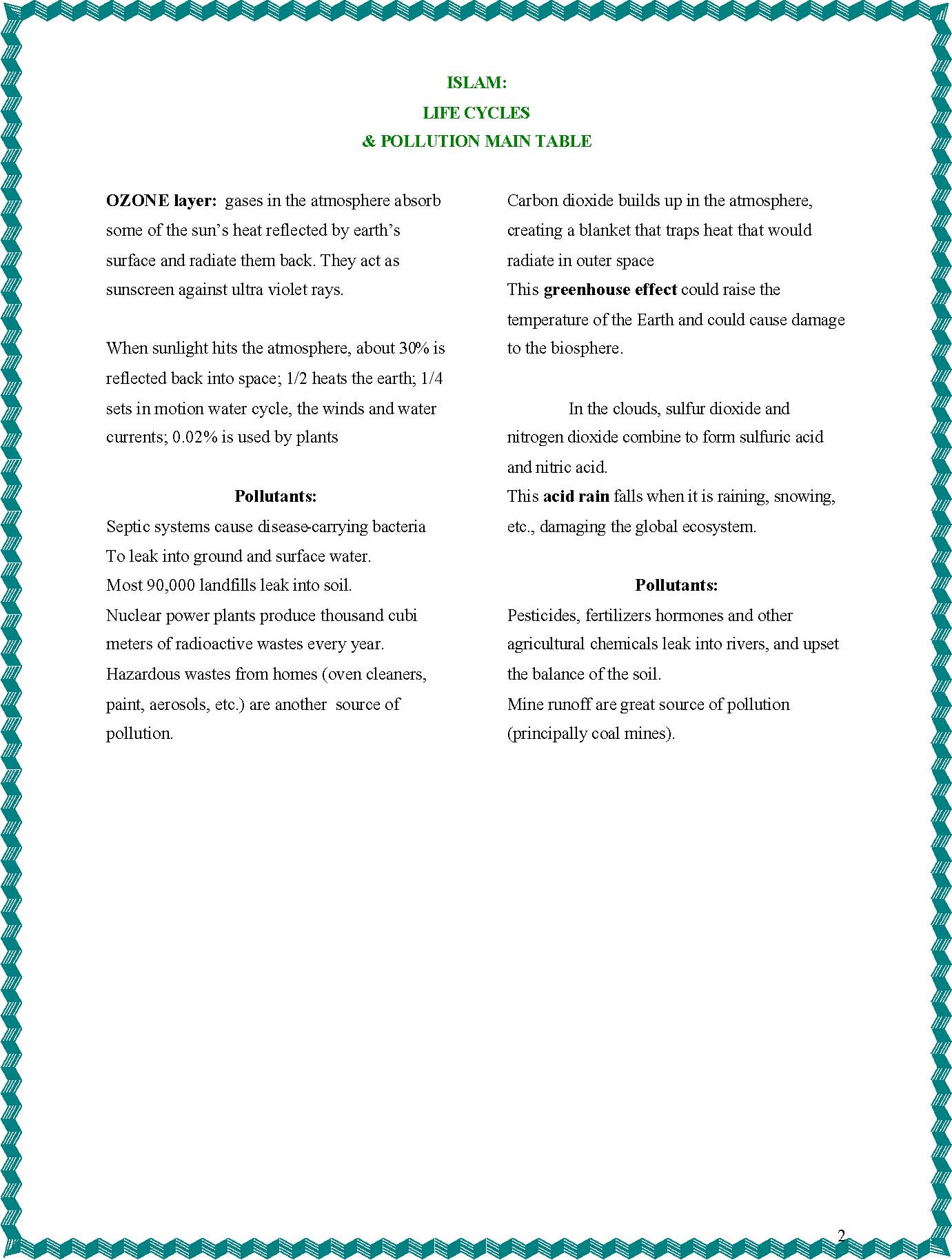
ISLAM:
LIFE CYCLES
& POLLUTION MAIN TABLE
OZONE layer: gases in the atmosphere absorb some of the sun’s heat reflected by earth’s surface and radiate them back. They act as sunscreen against ultra violet rays.
When sunlight hits the atmosphere, about 30% is reflected back into space; 1/2 heats the earth; 1/4 sets in motion water cycle, the winds and water currents; 0.02% is used by plants
Pollutants: Septic systems cause disease-carrying bacteria To leak into ground and surface water. Most 90,000 landfills leak into soil. Nuclear power plants produce thousand cubi meters of radioactive wastes every year. Hazardous wastes from homes (oven cleaners, paint, aerosols, etc.) are another source of pollution.
Carbon dioxide builds up in the atmosphere, creating a blanket that traps heat that would radiate in outer space This greenhouse effect could raise the temperature of the Earth and could cause damage to the biosphere.
In the clouds, sulfur dioxide and nitrogen dioxide combine to form sulfuric acid and nitric acid. This acid rain falls when it is raining, snowing, etc., damaging the global ecosystem.
Pollutants:
Pesticides, fertilizers hormones and other agricultural chemicals leak into rivers, and upset the balance of the soil. Mine runoff are great source of pollution (principally coal mines).
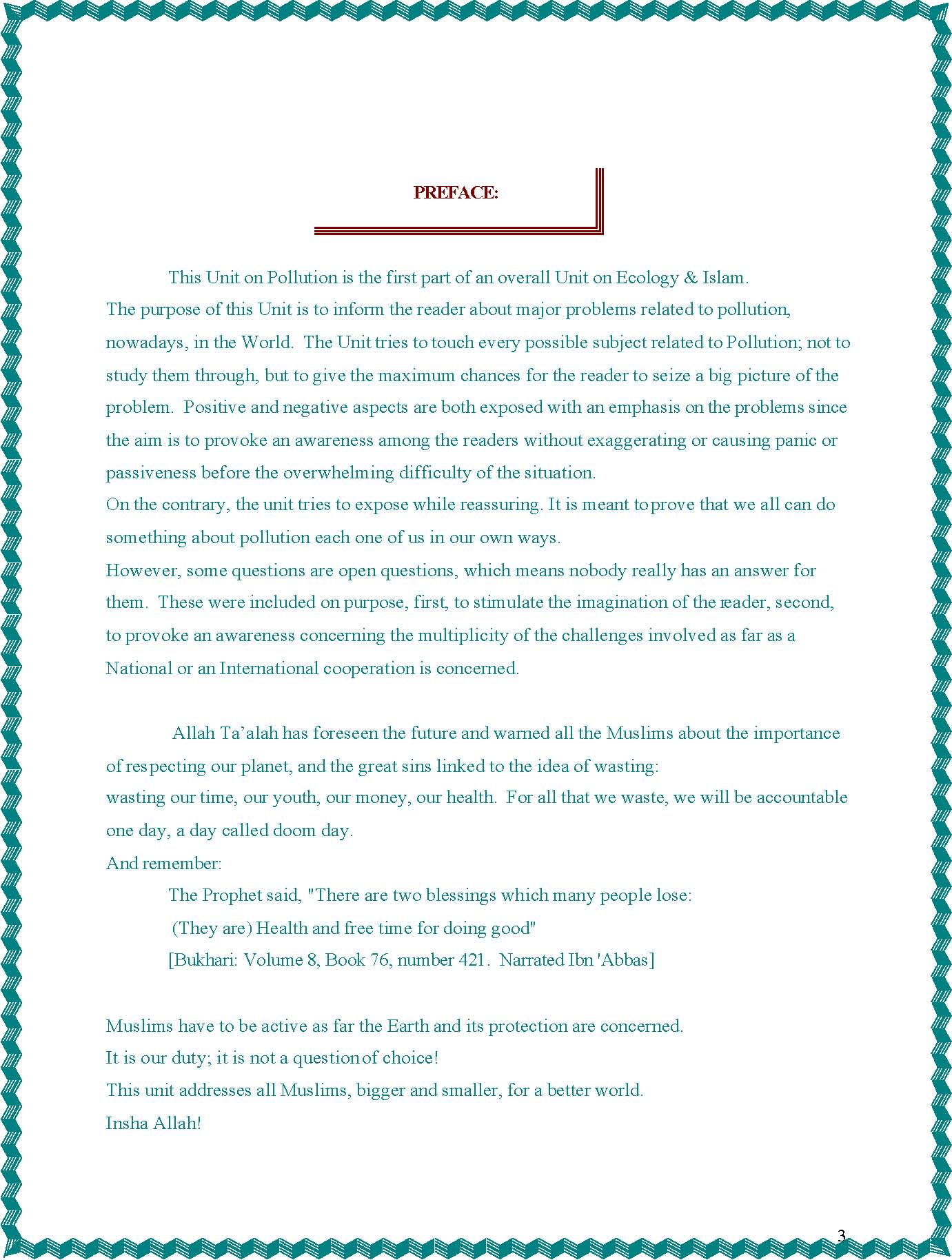
PREFACE:
This Unit on Pollution is the first part of an overall Unit on Ecology & Islam. The purpose of this Unit is to inform the reader about major problems related to pollution, nowadays, in the World. The Unit tries to touch every possible subject related to Pollution; not to study them through, but to give the maximum chances for the reader to seize a big picture of the problem. Positive and negative aspects are both exposed with an emphasis on the problems since the aim is to provoke an awareness among the readers without exaggerating or causing panic or passiveness before the overwhelming difficulty of the situation. On the contrary, the unit tries to expose while reassuring. It is meant to prove that we all can do something about pollution each one of us in our own ways. However, some questions are open questions, which means nobody really has an answer for them. These were included on purpose, first, to stimulate the imagination of the reader, second, to provoke an awareness concerning the multiplicity of the challenges involved as far as a National or an International cooperation is concerned.
Allah Ta’alah has foreseen the future and warned all the Muslims about the importance of respecting our planet, and the great sins linked to the idea of wasting: wasting our time, our youth, our money, our health. For all that we waste, we will be accountable one day, a day called doom day. And remember:
The Prophet said, "There are two blessings which many people lose: (They are) Health and free time for doing good"[Bukhari: Volume 8, Book 76, number 421. Narrated Ibn 'Abbas]
Muslims have to be active as far the Earth and its protection are concerned.
It is our duty; it is not a question of choice!
This unit addresses all Muslims, bigger and smaller, for a better world.
Insha Allah!
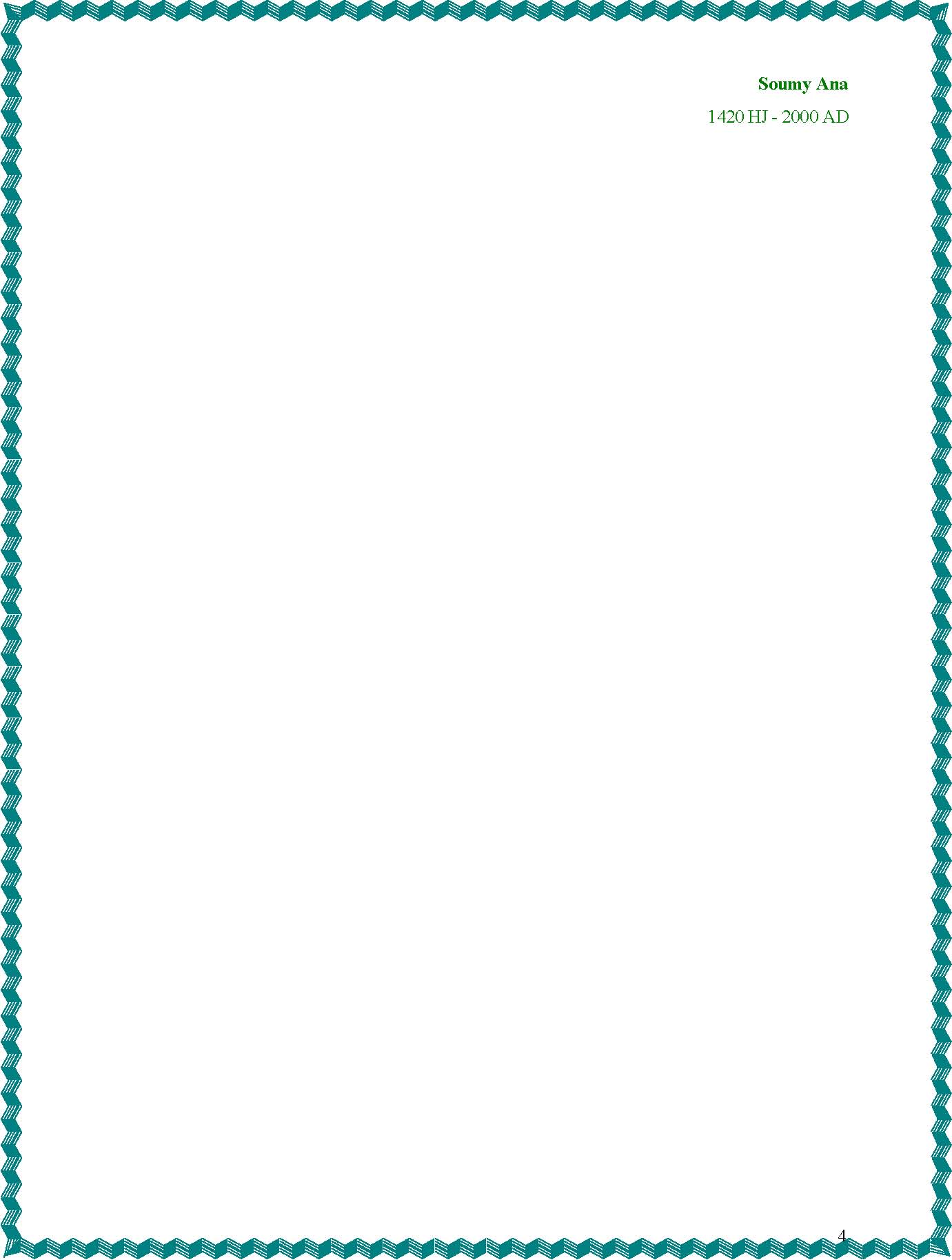
Soumy Ana
1420 HJ - 2000 AD
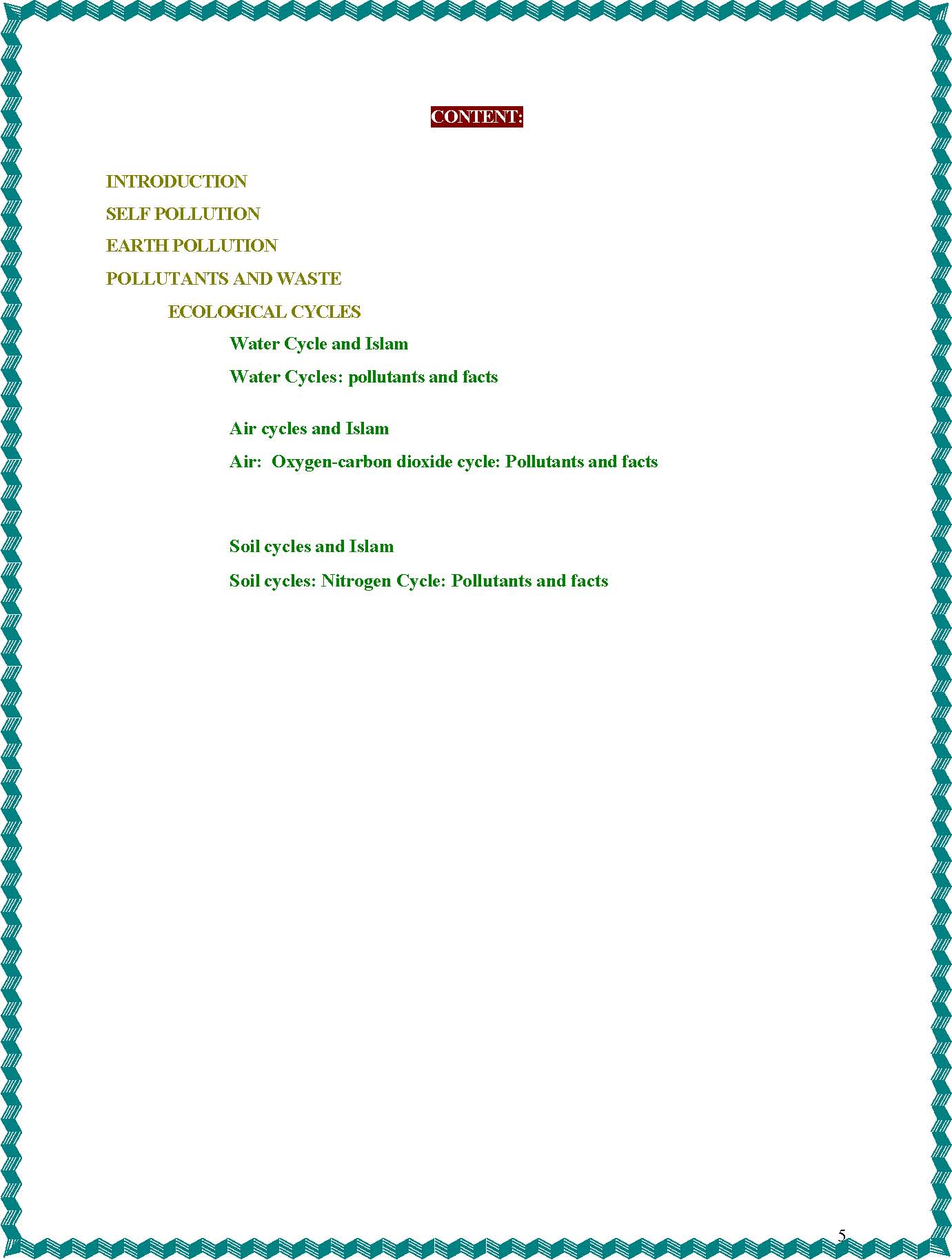
CONTENT:
INTRODUCTION SELF POLLUTION EARTH POLLUTION POLLUTANTS AND WASTE
ECOLOGICAL CYCLES
Water Cycle and Islam
Water Cycles: pollutants and facts
Air cycles and Islam Air: Oxygen-carbon dioxide cycle: Pollutants and facts
Soil cycles and Islam Soil cycles: Nitrogen Cycle: Pollutants and facts
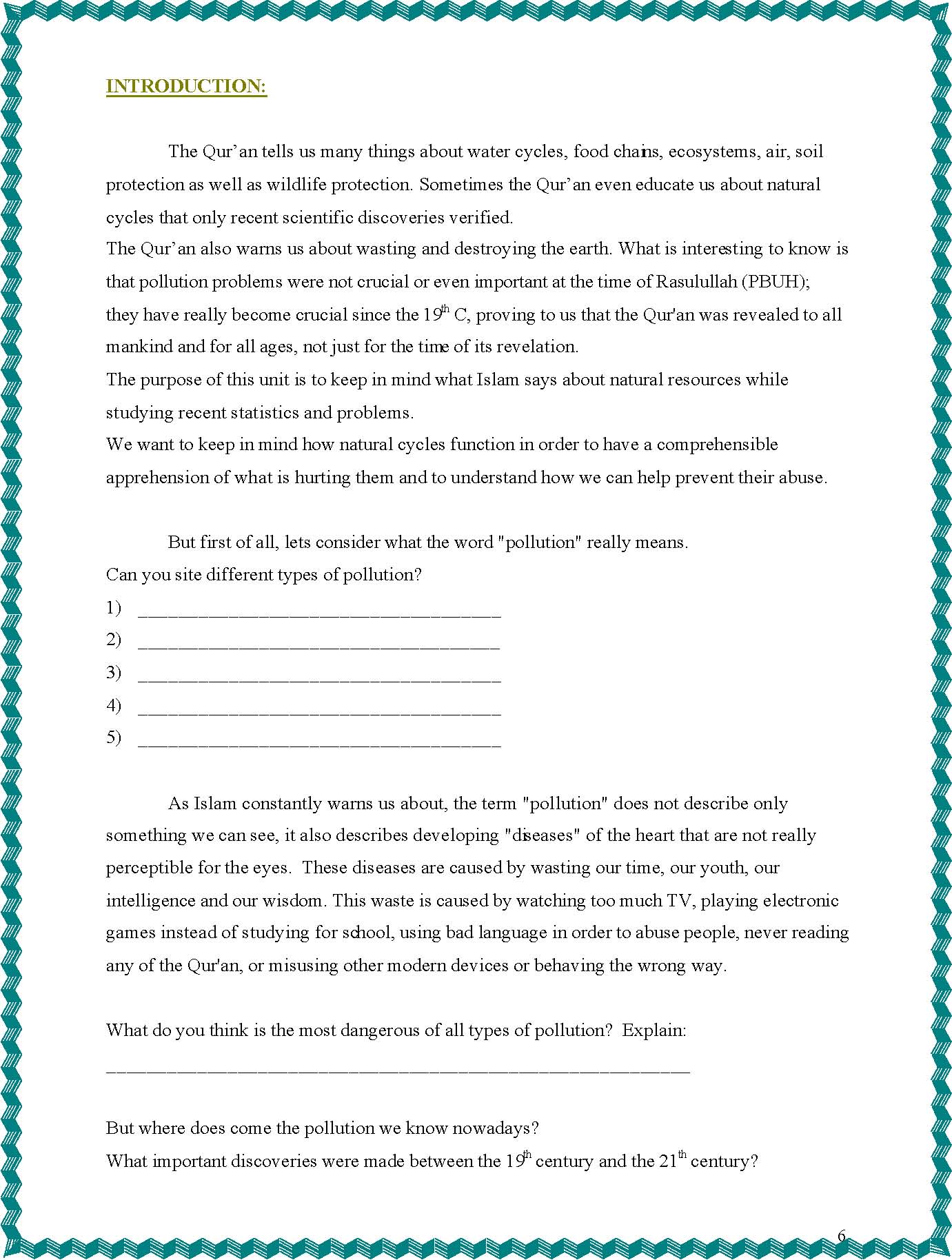
INTRODUCTION:
The Qur’an tells us many things about water cycles, food chains, ecosystems, air, soil protection as well as wildlife protection. Sometimes the Qur’an even educate us about natural cycles that only recent scientific discoveries verified. The Qur’an also warns us about wasting and destroying the earth. What is interesting to know is that pollution problems were not crucial or even important at the time of Rasulullah (PBUH); they have really become crucial since the 19th C, proving to us that the Qur'an was revealed to all mankind and for all ages, not just for the time of its revelation. The purpose of this unit is to keep in mind what Islam says about natural resources while studying recent statistics and problems. We want to keep in mind how natural cycles function in order to have a comprehensible apprehension of what is hurting them and to understand how we can help prevent their abuse.
But first of all, lets consider what the word "pollution" really means. Can you site different types of pollution? 1) ____________________________________ 2) ____________________________________ 3) ____________________________________ 4) ____________________________________ 5) ____________________________________
As Islam constantly warns us about, the term "pollution" does not describe only something we can see, it also describes developing "diseases" of the heart that are not really perceptible for the eyes. These diseases are caused by wasting our time, our youth, our intelligence and our wisdom. This waste is caused by watching too much TV, playing electronic games instead of studying for school, using bad language in order to abuse people, never reading any of the Qur'an, or misusing other modern devices or behaving the wrong way.
What do you think is the most dangerous of all types of pollution? Explain:
But where does come the pollution we know nowadays?
What important discoveries were made between the 19th century and the 21th century?
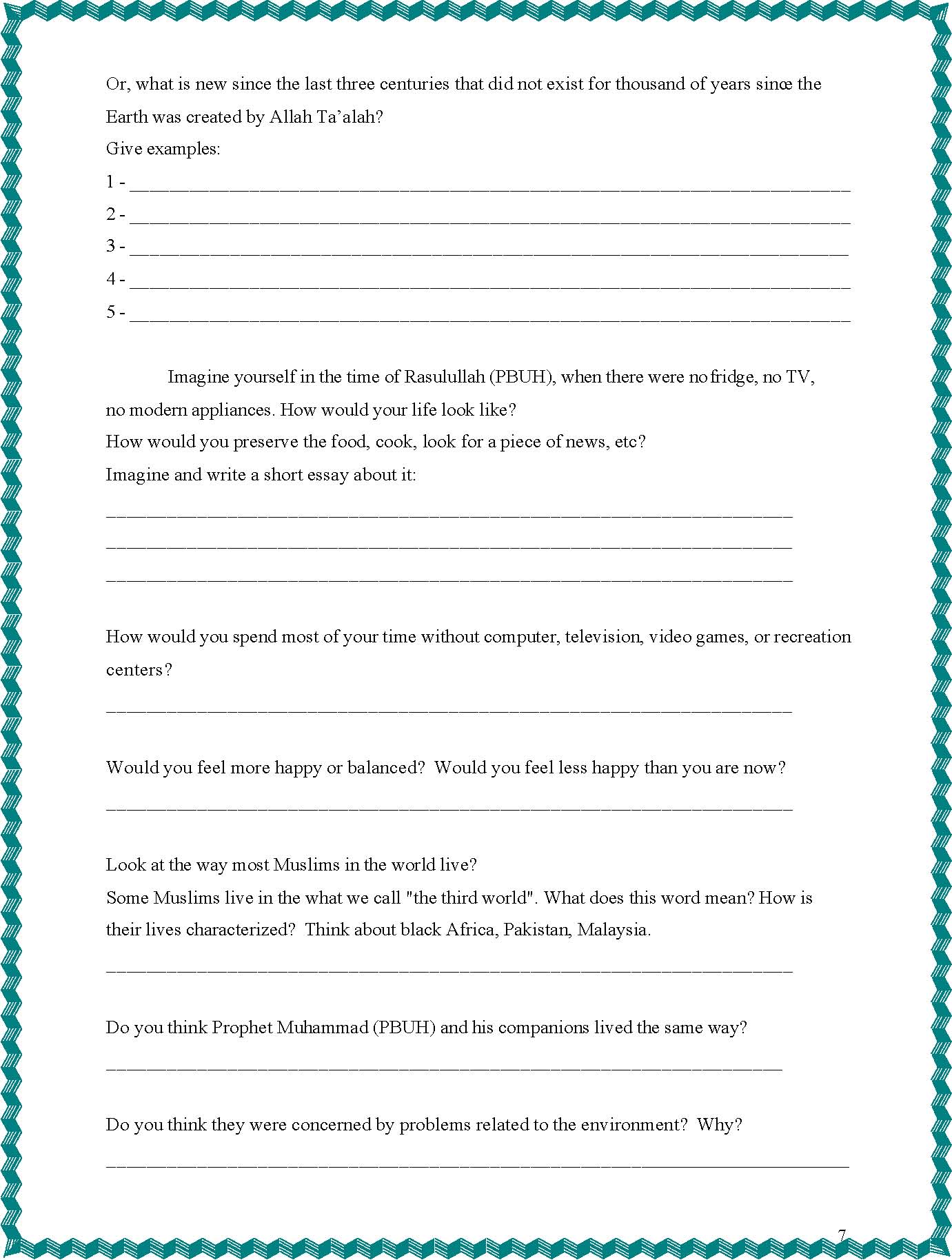
Or, what is new since the last three centuries that did not exist for thousand of years since the Earth was created by Allah Ta’alah?Give examples:1 - ________________________________________________________________________2 - ________________________________________________________________________3 - ________________________________________________________________________4 - ________________________________________________________________________5 - ________________________________________________________________________
Imagine yourself in the time of Rasulullah (PBUH), when there were no fridge, no TV, no modern appliances. How would your life look like? How would you preserve the food, cook, look for a piece of news, etc? Imagine and write a short essay about it:
How would you spend most of your time without computer, television, video games, or recreation centers?
Would you feel more happy or balanced? Would you feel less happy than you are now?
Look at the way most Muslims in the world live? Some Muslims live in the what we call "the third world". What does this word mean? How is their lives characterized? Think about black Africa, Pakistan, Malaysia.
Do you think Prophet Muhammad (PBUH) and his companions lived the same way?
Do you think they were concerned by problems related to the environment? Why?
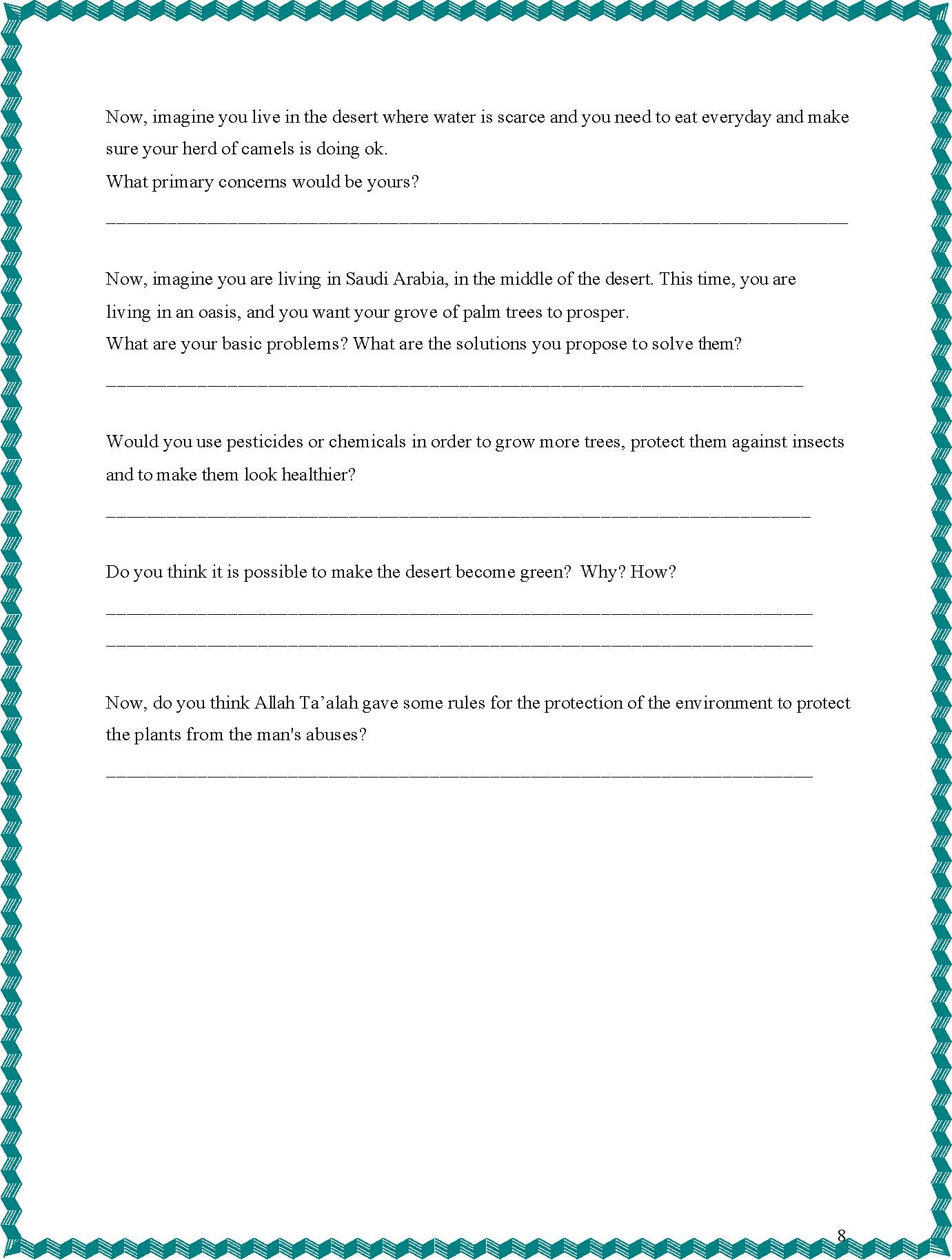
Now, imagine you live in the desert where water is scarce and you need to eat everyday and make
sure your herd of camels is doing ok.
What primary concerns would be yours?
Now, imagine you are living in Saudi Arabia, in the middle of the desert. This time, you are
living in an oasis, and you want your grove of palm trees to prosper.
What are your basic problems? What are the solutions you propose to solve them?
Would you use pesticides or chemicals in order to grow more trees, protect them against insects and to make them look healthier?
Do you think it is possible to make the desert become green? Why? How?
Now, do you think Allah Ta’alah gave some rules for the protection of the environment to protect the plants from the man's abuses?
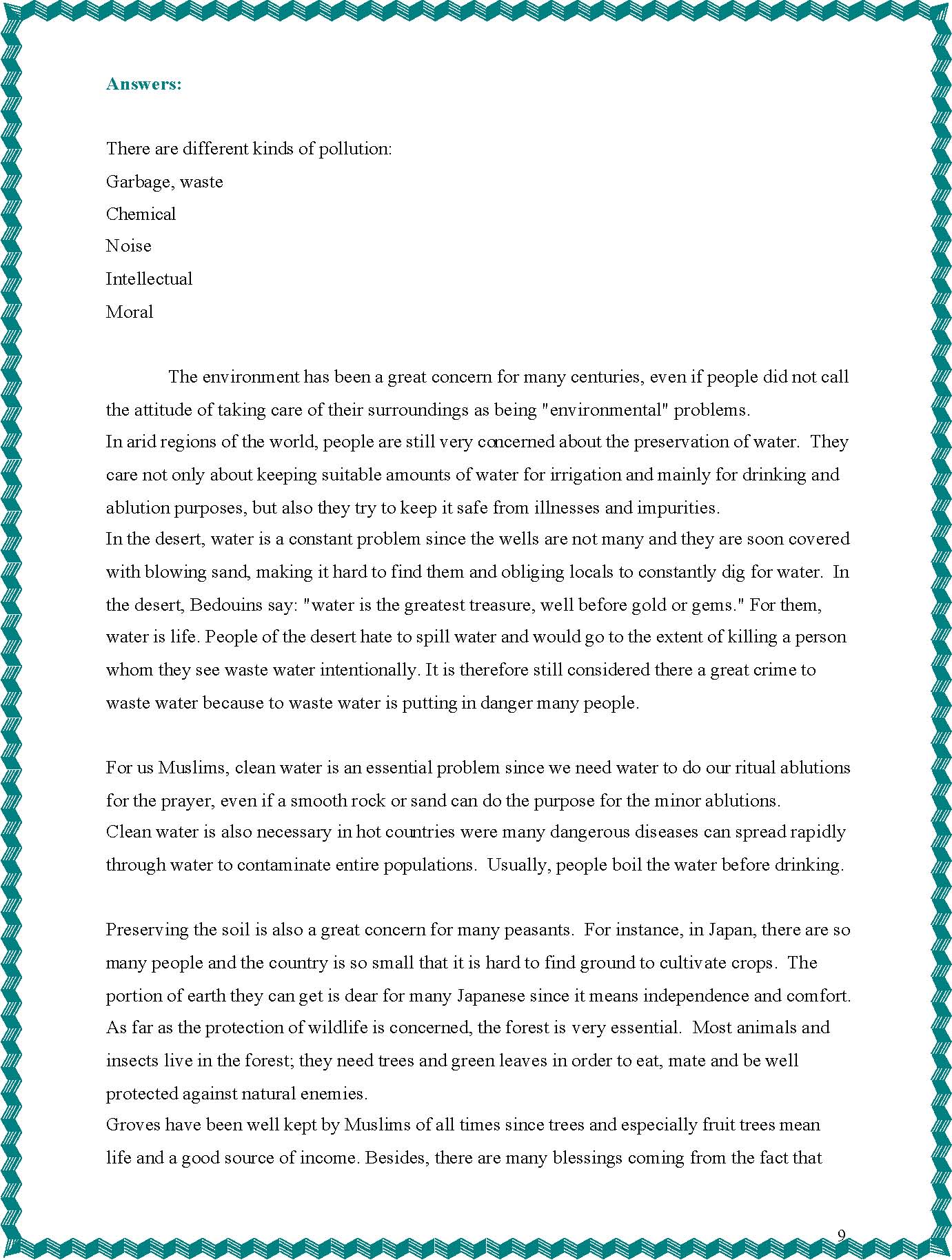
Answers:
There are different kinds of pollution: Garbage, waste Chemical Noise Intellectual Moral
The environment has been a great concern for many centuries, even if people did not call the attitude of taking care of their surroundings as being "environmental" problems. In arid regions of the world, people are still very concerned about the preservation of water. They care not only about keeping suitable amounts of water for irrigation and mainly for drinking and ablution purposes, but also they try to keep it safe from illnesses and impurities. In the desert, water is a constant problem since the wells are not many and they are soon covered with blowing sand, making it hard to find them and obliging locals to constantly dig for water. In the desert, Bedouins say: "water is the greatest treasure, well before gold or gems." For them, water is life. People of the desert hate to spill water and would go to the extent of killing a person whom they see waste water intentionally. It is therefore still considered there a great crime to waste water because to waste water is putting in danger many people.
For us Muslims, clean water is an essential problem since we need water to do our ritual ablutions for the prayer, even if a smooth rock or sand can do the purpose for the minor ablutions. Clean water is also necessary in hot countries were many dangerous diseases can spread rapidly through water to contaminate entire populations. Usually, people boil the water before drinking.
Preserving the soil is also a great concern for many peasants. For instance, in Japan, there are so many people and the country is so small that it is hard to find ground to cultivate crops. The portion of earth they can get is dear for many Japanese since it means independence and comfort. As far as the protection of wildlife is concerned, the forest is very essential. Most animals and insects live in the forest; they need trees and green leaves in order to eat, mate and be well protected against natural enemies. Groves have been well kept by Muslims of all times since trees and especially fruit trees mean life and a good source of income. Besides, there are many blessings coming from the fact that people and animals can profit from those trees. Allah warns us against killing or torturing animals for pleasure. Furthermore Muslims are discouraged from eating too much meat, this to be more healthy and to make sure more animals will live and provide for a balanced food chain and ecosystem.
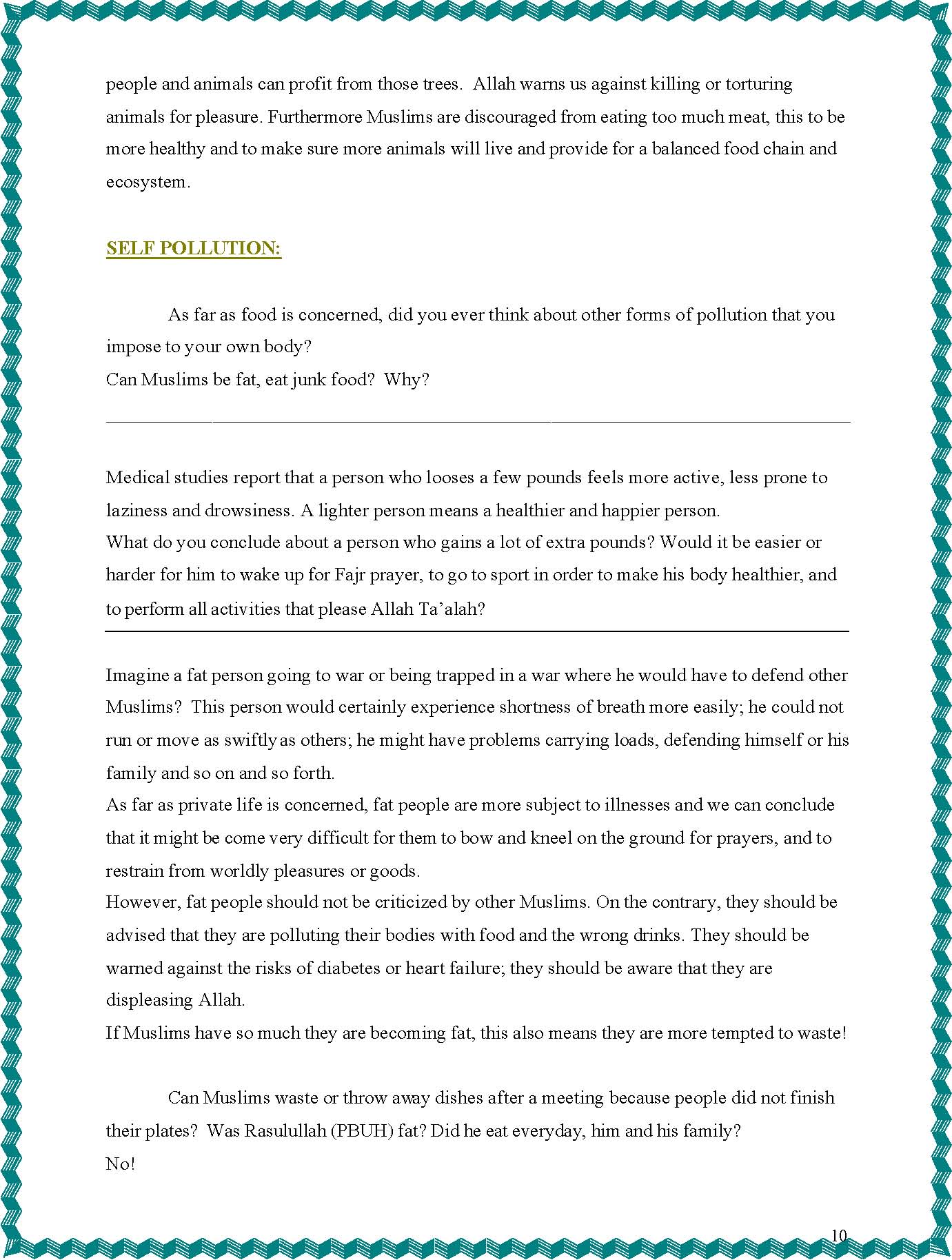
SELF POLLUTION:
As far as food is concerned, did you ever think about other forms of pollution that you impose to your own body? Can Muslims be fat, eat junk food? Why?
Medical studies report that a person who looses a few pounds feels more active, less prone to laziness and drowsiness. A lighter person means a healthier and happier person. What do you conclude about a person who gains a lot of extra pounds? Would it be easier or harder for him to wake up for Fajr prayer, to go to sport in order to make his body healthier, and to perform all activities that please Allah Ta’alah?
Imagine a fat person going to war or being trapped in a war where he would have to defend other Muslims? This person would certainly experience shortness of breath more easily; he could not run or move as swiftly as others; he might have problems carrying loads, defending himself or his family and so on and so forth. As far as private life is concerned, fat people are more subject to illnesses and we can conclude that it might be come very difficult for them to bow and kneel on the ground for prayers, and to restrain from worldly pleasures or goods. However, fat people should not be criticized by other Muslims. On the contrary, they should be advised that they are polluting their bodies with food and the wrong drinks. They should be warned against the risks of diabetes or heart failure; they should be aware that they are displeasing Allah. If Muslims have so much they are becoming fat, this also means they are more tempted to waste!
Can Muslims waste or throw away dishes after a meeting because people did not finish their plates? Was Rasulullah (PBUH) fat? Did he eat everyday, him and his family? No!
